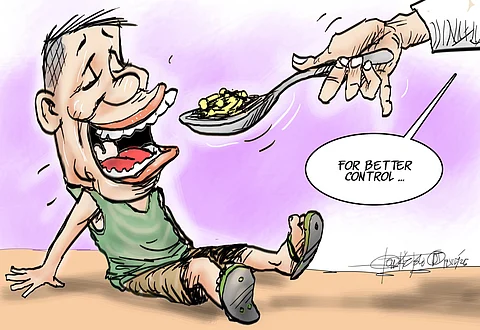
- NEWS
- the EDIT
- COMMENTARY
- BUSINESS
- LIFE
- SHOW
- ACTION
- GLOBAL GOALS
- SNAPS
- DYARYO TIRADA
- MORE

Based on the outcome of a recent survey by an independent pollster and a broader sentiment that cash subsidy programs stimulate patronage rather than progress, a reorientation of the anti-poverty thrust should be undertaken.
Disapproval of the incumbent administration’s initiatives to control inflation (66 percent) and reduce poverty (54 percent) was the dominant response among respondents, reflecting their perception that the programs have failed to help the poor.
Other key concerns were the ineffectiveness of the administration in fighting corruption (50 percent), increasing workers’ pay (48 percent), and addressing involuntary hunger (40 percent).
All these problems are interconnected as they stem from the priorities of the war against poverty.
Up to next year, P242.422 billion will be spent on doles that many have associated with partisan politics.
The Walang Gutom Program, Ayuda sa Kapos ang Kita Program (AKAP), Tulong Panghanapbuhay sa Ating Disadvantaged/Displaced Workers (TUPAD), and Assistance to Individuals in Crisis Situations (AICS) were all designed to provide temporary relief.
The economics of doles is simple, which is injecting significant cash into low-income households to boost consumption.
A University of the Philippines economist compared the cash subsidies to throwing public money from a helicopter.
Programs like Walang Gutom and AKAP provide direct financial relief, theoretically helping households combat the high prices of commodities.
Cash transfers, however, also fuel inflation, which effectively means the doles do not amount to much, since the real value of the subsidies has been eroded.
If food prices rise, Walang Gutom’s P3,000 monthly aid may be insufficient, reinforcing the public perception that the administration is failing to control inflation.
The public call, as reflected in the survey, is for transformative policies such as better wages, price stability, and systemic poverty reduction — all contained in a cohesive program.
By focusing on short-term relief, the administration sacrifices opportunities to address the root causes of public discontent.
The administration has a Philippine Development Plan that emphasizes agricultural modernization, industrial growth, and governance reforms. The dole-heavy budget, however, diverts funds from these priorities.
Investing the amounts earmarked for doles in farm mechanization or micro, small, and medium enterprises (MSMEs) could create sustainable jobs, addressing the 48-percent disapproval of workers’ pay and 54 percent of poverty.
Filipinos’ frustration reflects a desire for reforms that doles cannot deliver.
The government has a structured and targeted anti-poverty plan, which is the Pantawid Pamilyang Pilipino Program (4Ps), the funding for which is equivalent to the amount earmarked for doles.
In the 2025 budget, the 4Ps allocation was even reduced to augment the funding for the unprogrammed allocations — which eventually makes room for pork barrel projects.
The 4Ps is targeted, conditional, and focused on human capital, offering sustainable poverty reduction and more substantial alignment with development goals.
However, its narrower scope misses some vulnerable groups. The doles’ band-aid relief contrasts with the 4Ps’ long-term investment.
It is the flagship conditional cash transfer program targeting 4.4-million poor households or those who are below the poverty threshold.
It provides monthly grants of P300 to P700 per child for education, P750 for health, and a rice subsidy of P600, contingent on conditions such as 85-percent school attendance within a school year, regular health checkups, and family development sessions.
The objective is to achieve long term poverty reduction through human capital development, aligning with the goals of reducing poverty, stunting, and unemployment.
Had the amount for the cash subsidies been invested in 4Ps, a larger number of poor households would have been covered.
Ayudas, as much as they are believed to foster patronage, are far from being part of the solution to ending poverty.
Instead, it keeps people impoverished so they can be manipulated when the need arises.
